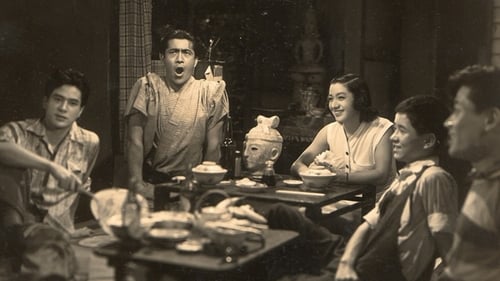
Yamamoto
Following the Second World War, the lives of various people in a poverty-stricken area of Tokyo are entertwined. Pachinko parlor girls, shoeshine boys, a maker of costume jewelry, and a streetcorner artist all struggle to make their livings and to find happiness in difficult surroundings.

Mantaro
Directorial debut by Umetsugu Inoue, the famous director of Musicals

President Kuwabara
1950s Japanese comedy.

製作は「青春会議」の藤本真澄。原作は源氏鶏太の「ホープさん」「三等重役」の二作より「風雪二十年」の猪俣勝人がシナリオ化したもので、監督は「結婚行進曲」の市川崑、撮影も同じく飯村正である。出演者の主なものは「呼子星」の小林桂樹、「青春会議」の杉葉子、小泉博、「慶安秘帖」の島崎雪子のほか河村黎吉、沢村貞子、斎藤達雄などである。 東洋鉄業に勤める若原俊平は通称「ラッキーさん」。庶務課から秘書課へ抜てきされ、給料の前借をして全部同僚に奢ってしまうというような男。同じ課の泰子は彼にほのかな好意を感じました。泰子の父町田さんは、秋葉社長にタイプが似ているので、冠婚葬祭にはよく社長の替玉をつとめます。東洋鉄業の元社長、奈良財閥六代目庄右衛門の令嬢由起子さんの美容院開店祝いに行ったときも、社長の替玉であることを白状した上、お葬式の帰りであることまで白状して大失敗を演じました。秋葉社長はこの失態をつぐなうため由起子さんのお婿さんを世話しようと季節はずれの社員大運動会を催しました。若手独身社員は我こそと大はりきりでしたが、由起子さんには若原が気に入ったらしく、由起子さんを想っていた近藤と、若原に好意を寄せていた泰子とは失望を感じました。そしてその失意がこの二人を結びつけましたが、一方由起子さんは奈良財閥のため銀行家勝田家の令息と結婚することになり、ラッキーさんの若原は一人淋しく釧路所長に栄転して行きました。

Suyama

In a small town, according to the homecoming of Professor Ishinaka, the youth culture group was overwhelmed to make a presentation for the summer festival, but because of lack of funds, she works part-time at the spectacle of a tour, a haunted house Especially. The ghost was a struggle amongst the people, it was a great success in filling the crowd, but in the circus hut next to it, Kenji who was supposed to have disappeared was pitiful.

Japanese "kayo" film based on the song "Ieraishan" by Yoshiko Yamaguchi.
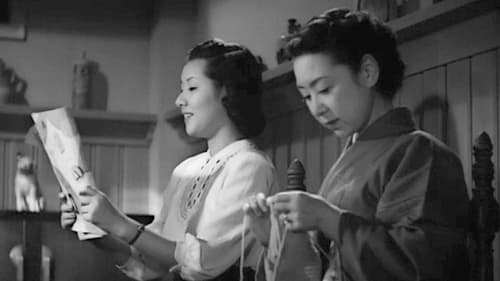
Setsuko is unhappily to Mimura, an engineer with no job and a bad drinking habit. She had always been in love with Hiroshi but both of them failed to propose when Hiroshi left for France a few years ago. Now he is back and Mariko (Setsuko's sister) tries to reunite them. She too is secretly in love with Hiroshi.

Adaptation of a novel by Yojiro Ishizaka, originally released in two parts.

Ginpei
An early film by Kon Ichikawa
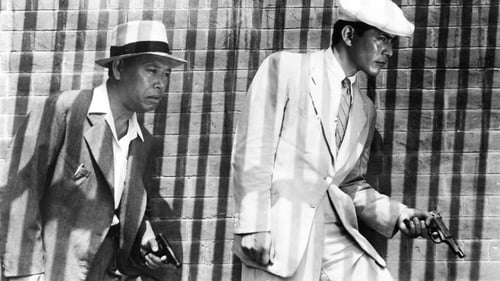
A bad day gets worse for young detective Murakami when a pickpocket steals his gun on a hot, crowded bus. Desperate to right the wrong, he goes undercover, scavenging Tokyo’s sweltering streets for the stray dog whose desperation has led him to a life of crime. With each step, cop and criminal’s lives become more intertwined and the investigation becomes an examination of Murakami’s own dark side.

Edokko
The tale of a feudal swordsman who cynically takes no responsibility for anything, relegating it to others, and then taking the credit.

The tale of a feudal swordsman who cynically takes no responsibility for anything, relegating it to others, and then taking the credit.

A film dealing with the comings and goings of individuals in the immediate postwar period.

Bando Tokichi
A young man rents an apartment in Tokyo and discover it was built by his father. He falls in love with the daughter of the mistress of the house and decides to marry her. Only to discover that his father is is in debt and wants him to marry Ranko so that she may help his company by granting 1.5 million yen. Teruko decides to borrow money from a greedy bar owner who lends her money on certain conditions and photographs her without her consent. A love traingle forms between Koroku, Ranko, and Teruko. Things complicate when Koroku marries Teruko and Tsugawa threatens them for the money causing many twists and turns.
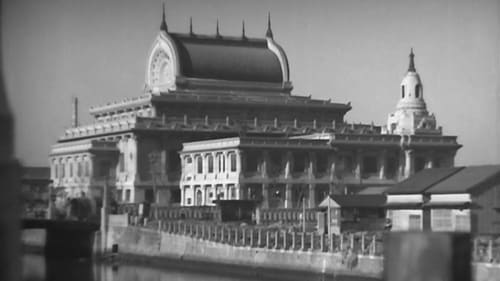
Tamekichi
An errant salaryman's son gets lost until a man from the Tokyo tenements brings him to vendor Tane, who's reluctant to let the kid board.

桑原/Kuwabara
桑原は銀行でも古参株の一人である。彼のケチなことにおいては既に定評があり、同僚から一本、二本と巧みに煙草を稼いだりして「ポケット騒ぎ」という俗名さへ持たされている。彼には一人娘がいる。女房にも甘いが、ことに娘のことになると極端な愛溺を示して同僚達の反感を買うのが常である。彼は又上役の部長には最も信用があり、一番昵懇になっていると悦に入っている。そこにつけ込んだ同僚が、部長が桑原の娘を息子の嫁にとかねがね思っていると造言してもったいらしく桑原に告げる。部長絶対主義の彼はそれを信じ、娘には許婚者がいることも見捨ててかかるのである。

Yuichi's father
Hisshoka is a 1945 Drama film directed by four Japanese directors.

Japanese Warmovie
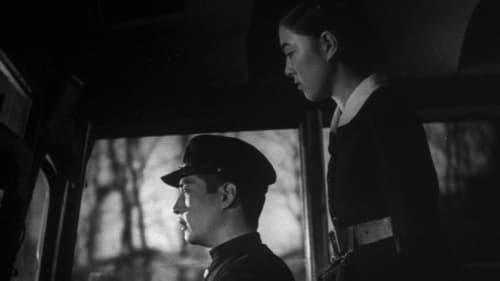
A wealthy family will not allow the military to grow crops on their fields due to their superstitious beliefs about their son's illness.

原研吉と渋谷実の映画(1943年)

Japanese war movie.
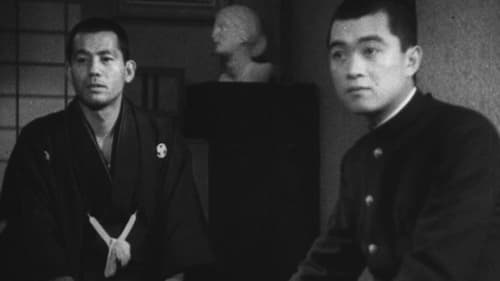
Father
A family story in the year of 1943 during the war. The director is Shunkai Mizuho, who worked on "Hibari no Circus Sad Kobato" starring Hibari Misora after the war. Previously, there is only a 6-minute short version in the National Film Archive, therefore, the full version is this movie is very valuable. This is considered a masterpiece that depicts a happy family of 7 (a father, a mother, 3 sons and 2 daughters).They care about each other, and also trust each other. Father started to ask all the children "what do you want to be in the future?" since an early age. Boys said they want to go to college, they want to be painters, and when it comes to the girls, although they wanted to be generals, their answer was "become a bride, a wife, and a good mother." Brothers and sisters get along well and occasionally fight, but they all discuss the cause, and would apologize to each other. The story was so gentle that it is hard to believe it was during the war.

Hiromasa Nomura World War II era film

Pretty Oshige is deceived by her first love. After this, she lives a hard lifestyle, working at a number of jobs. Her only pleasure is her nephew, who eventually becomes a merchant marine. When Oshige meets her old love ten years later, she is able to forgive him and even thank him for the path her life has taken.

Amusing masterpiece from director Yoshimura Kazusabu divided in two parts taken from the newspaper serial novel of Shishiko Shishi. Like in "Warm Current", Shin Saburi, Mieko Takamine and Mitsuko Mito are appearing, but this is a fresh comedy very unusual for wartime.

This was 1942, so it was a national policy film, no matter what you call it. But when the war was still on the winning side, there wasn't even a little bit of sadness in the film (as the war was getting worse and worse, the burdens on our backs were increasing day by day, and we had to keep forming a line for tomorrow with nowhere to go (Akira Kurosawa's "The Most Beautiful", Admiral Nomura's "Enemy Air Raid", etc.) (Song of Annihilation, directed by Sasaki Yasushi). The film closes with the hope of the blue cloud that is bubbling up in the air. Or it may be the last time that a Japanese film talks about war and looks at the end of the war with an unconcerned eye.

A hostile Chinese nurse (Yamaguchi) who works in an orphanage is won over by the care and commitment of the Japanese doctor (Sano) who treats her wards. Disease outbreaks and family obligations, however, threaten to torpedo their budding romance.

Kajikawa
Uta’s mother died when she was six years old; her father she never met. She was forced to adopt a traveller’s life when her grandmother died, and now she is a dancer and part of a family of actors who travel from town to town, setting up street performances. A way of escape from this marginal existence arises when she gets the chance to move to tea merchant Hiramatsu’s place, where she is asked to teach his daughter to dance.
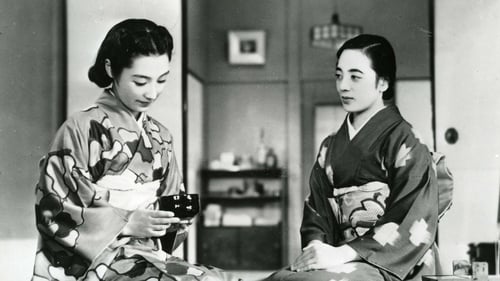
Suzuki
After the death of her husband, Mrs Toda and her youngest daughter receive a frosty welcome from the extended family.

A story of a store that makes Tabi socks.

Dr.Sawamura
Movie about a devoted and single woman and her daughter. The mother's nickname is "Bokuseki" (wooden head) because of his supposed stubbornness. No.10 in the list of "The 10 best films of 1940" by Kinema Junpo.

A young yakuza student is led back to the straight and narrow path by his uncle.

Kensaku

Kinuyo is a daughter of rice cracker shop in downtown. She fell in love with her sister's boyfriend. It is a story whose theme is warm human relationships in a town of customs and manners.
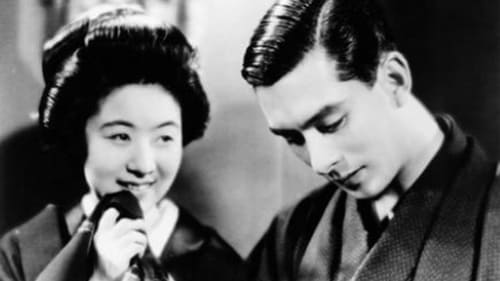
Keizô, Osumi's brother
A young student of traditional dance falls in love with a handsome young man who visits the dance school in order to take photographs.
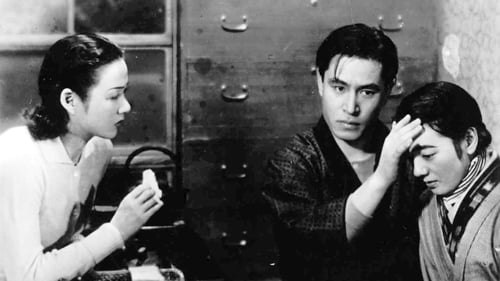
Fujio Gyōda
A man who works late hours at a deadening job lives together with his wife and his younger sister. The younger sister's a modern girl who's starting to receive romantic attention from one of her co-workers.

Father
A follow-up to Children in the Wind, Four Seasons of Children(a.k.a. Kodomo no Shiki) is also based on a Tsubota Joji novel. The film is divided into two chapters, following the young protagonists' minor adventures and real-world awakenings over spring and summer, then autumn and winter.

Haruki
A young doctor, Kozo Tsumura, falls for young nurse Katsue Takaishi. But she's got a secret: she's a widow with a son. Kozo and Katsue decide to run away to Kyoto, but her child suddenly became sick and she just missed the train and Kozo. She makes it to Kyoto finally, but is unable to meet him. Plus she isn't accepted into Kyoto society. She goes back to her hometown and tries to forget him. She quits the hospital to concentrate on her singing. She makes her professional debut with the hit "Aizen Katsura". Kozo is in the audience.

Kudō
The movie follows a young woman (Kinuyo Tanaka), a daughter of a high-ranking businessman and his neglected mistress, as she struggles to ease her mother's loneliness, while also having an affair with her father's subordinate.

Kageyama
Shigeo is an aspiring writer living with his girl friend Minako and hoping for success and a better tomorrow every day. Both live on what Minako earns from working in a café. Shigeo is not happy with the situation and neither is his family who do not approve of Minako. Especially his uncle tries to convince him to leave Minako, even using his influence behind the scenes. Things start to change when Shigeo's sister pays the young couple a visit, being the first member of Shigeo's family to actually get to know Minako in person.

Gunji Ōhira
Pre-war Asakusa was a riotous district of cabarets, dance-halls and brothels - a striking backdrop for Shimazu's story of innocence and experience. Pretty, young Reiko is the new dancer in an infamous theatre troupe, and her fellow performers try to protect her virtue in a land of vice. Meanwhile, an ageing actor wants to be a hero off stage as well as on, and the troupe matriarch Marie has to keep them all together.

Father
On vacation's eve, a boy is sent to the countryside to live with his uncle after his father is imprisoned and accused of embezzlement.

A Japanese wartime film directed by Yasushi Sasaki.

Sabu Toshinobu is an archaeologist who has taken a liking to Kinuyo Tanaka, the daughter of an archaeologist at an inn in Izu, where he is visiting to conduct an excavation. Sabun gets along well with his childhood friend Michiko Kuwano, but his mother (Fumiko Okamura) is against her, so he gives up easily and ends up being married to Kinuyo Tanaka.

Sabu Toshinobu is an archaeologist who has taken a liking to Kinuyo Tanaka, the daughter of an archaeologist at an inn in Izu, where he is visiting to conduct an excavation. Sabun gets along well with his childhood friend Michiko Kuwano, but his mother (Fumiko Okamura) is against her, so he gives up easily and ends up being married to Kinuyo Tanaka.
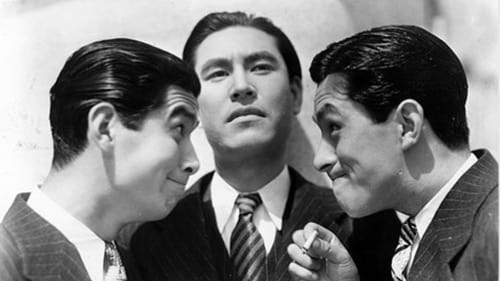
Isoyama - Chief
Three men vying for the same job end up chasing the same girl in this comedy-drama from noted Japanese director Yasujiro Shimazu.

A businessman’s daughter falls in love with one of her father’s employees.

A 1937 Japanese film.

Keizo
Three men fall in love with the same young girl who works in a tonkatsu restaurant in the Shitamachi district of Tokyo.

Doi
Episode in the life of a composer of a popular Japanese song.

A musical film made for the inauguration of Shochiku's Ofuna Studio, with an all-star cast of the era.

A neighbor
Otoku asks her brother Bunkichi to speak with her son Seiichi, a young man for whom sacrificed everything but who now seems to be headed for a wastrel life. Bunkichi admonishes the boy to study harder, but it seems his uncle's advice may already be too late.

Sadanosuke Kajiwara
A melodrama about a businessman's relations with the three women in his life.

Returning villager
昭和の名匠・清水宏監督が、川端康成の短編小説「有難う」を上原謙主演で映画化したロードムービー。伊豆地方の美しい自然を背景に、バス運転手と乗客たちが織り成す人間模様をユーモラスに描く。道を譲ってくれた人々に「ありがとう」と声を掛けることから、「ありがとうさん」と呼ばれて親しまれているバス運転手。そんな彼のバスに、貧しさから東京に売られていく娘とその母親、訳ありの女、威張り散らすヒゲの紳士らが乗り込んでくる。(eiga.com)

Teizo
A period piece about the love of a wealthy blind woman, a teacher of koto and shamisen, and her devoted manservant. Based on a novella by Tanizaki Junichiro.

Yoshi-san
A Japanese comedy from the end of the silent era (it has music) from a popular series. A feud, a practical joke and romance are the set up for some great comedy and drama from a team of distinctive appearance who are exploiting their silent cinema styles to the full.

Сигэта
Jyuta, an honest owner of a taxi company, has a younger half-brother who is involved in the yakuza world and doesn’t get along well with his mother. Jyuta tries to correct him…

Ôsaki's father
The story is centered around the devastating experiences of two villagers, Osaki Shuichi, and his cousin, Nishimiura Kinue, when they leave their hometown for the metropolis of Tokyo. They are in love with each other, but Kinue is expected to marry the lawyer Kanda Seiji. In consequence, Shukichi leaves for Tokyo, where he becomes tutor to the son of the rick Iwaki family. The heartbroken Kinue also makes her way to the capital, where she becomes a bar hostess.

Seijiro
The poor novelist Yamamoto is writing his novel, determined and with a headband around his head. With him, the novelist who is always in trouble paying his bills, is the girl Saya who becomes the model for his novel. Saya however is in love with a young driver. When he is forced to move into a spa town as the result of the jealousy of another man Saya is terribly sad. But with the help of Yamamoto the driver's rival can be revealed and Saya can finally be with her beloved.

Heinosuke Gosho evokes in this film the family conflicts engendered by the eternal problem of a father who projects his professional desires on the life of his son. The sister Machiko is the essential link that will allow everyone to apologize to each other and achieve reconciliation
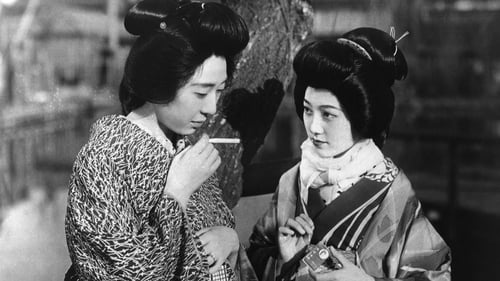
Shôkiku's father
An aging geisha, whose angry teenage son is ashamed of her profession, works alongside a young geisha, resentful of her family for forcing her into a life of ignominy.

Japanese silent film.

Kubota, an engineer
"The Dancing Girl of Izu" tells of the story between a young male student who is touring the Izu Peninsula and a family of traveling dancers he meets there, including their youngest girl. The student finds the naïve girl attractive even though he eventually has to part with the family after spending memorable time together.

Neighbor's husband
This pair of gentle yet witty and inventive comedies from the director of The Neighbour's Wife and Mine typify both the formal experimentation of early Japanese sound cinema and the social milieux that Shochiku tended to depict. 'Virtually plotless, and feeling more like comic sketches than fully developed stories,' writes Arthur Nolletti, Jr, 'these light comedies, or farces, take a wholly trivial matter (often a socially embarrassing situation) and use it as a springboard for a succession of gags.' Much of the films' distinction comes from the wit of Gosho's direction, the imaginative use of the new sound technology and the charm of the acting, particularly of the heroines (Kinuyo Tanaka in Bride; Hiroko Kawasaki in Groom). Yet in both films, Gosho finds room for some shrewd observation of character and environment, subtly exploring the values and assumptions of the suburban petit bourgeoisie.
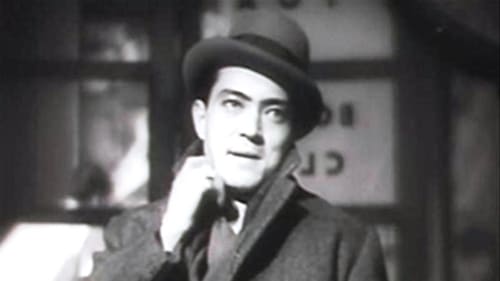
Nozawa
Early Japanese sound film, a remake of Josef von Sternberg’s DOCKS OF NEW YORK set in Yokohama.

The three-hour Ai yo jinrui to tomo ni are / Love, Be with Humanity (1931) starts as a satire of alienation in the world of money, develops into a lumberland epic with a forest fire on Sakhalin Island, turns into a tragedy of King Lear dimensions, and manages to amaze the blasé audience with a happy end in the Wild West.

The love of an older sister who worked as a geisha but decided to open a bar under the auspices of a millionaire

Rokuzo

The 1929 Japanese film "Mother" which helped child actress Hideko Takamine become a star.

A melodrama about an orphan and her mother who are separated and lose contact, but are later reunited.

Genshichi
Two criminal brothers try to go straight but face opposition from one of their criminal cohorts. Considered to be a lost film.















































